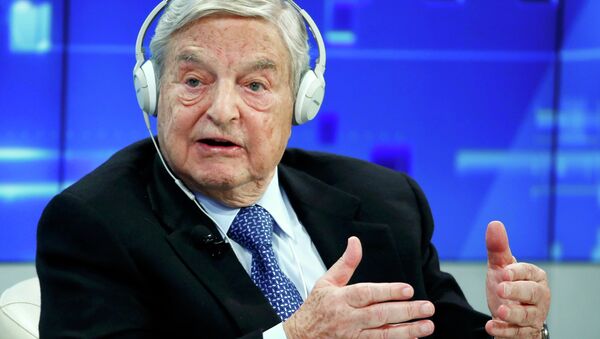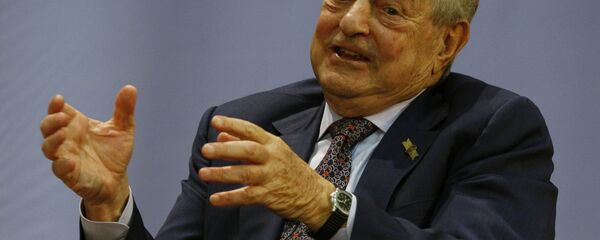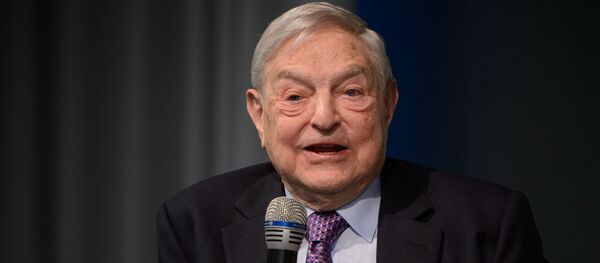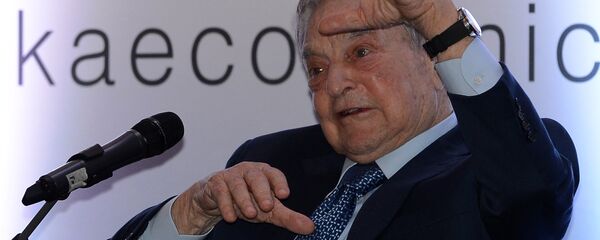Delivering his speech at the annual economic forum of the European Commission on Thursday, Hungarian-American billionaire Soros endorsed those Hungarians who "have [recently] resisted the deception and corruption of the mafia state the Orban regime has established."
"[Orban] sought to frame his policies as a personal conflict between the two of us and has made me the target of his unrelenting propaganda campaign. He cast himself in the role of the defender of Hungarian sovereignty and me as a shady currency speculator who uses his money to flood Europe — particularly his native Hungary — with illegal immigrants as part of some vague but nefarious plot," Soros said, insisting that "this is the opposite" of who he is.
However, Orban's response was not long in coming.
"This is a declaration of war, no doubt," the Hungarian prime minister told state radio, as quoted by Reuters. "The only network which operates in mafia ways, which is not transparent… in Hungary is the Soros network."
"This is why we must insist, and I personally insist on having a parliamentary decision on making these organizations transparent," Orban added.
The legislation requires foreign accredited universities to provide educational services in the countries of their origin and bans them from awarding Hungarian diplomas in the absence of an agreement between Hungary and a country of accreditation. However, while the Budapest-based CEU is accredited in the US it does not provide any educational services in the country.
Furthermore, back in April, Orban kicked off a nationwide campaign "National Consultation 2017" to draw popular support against Brussels' migration policies and controversial activities of foreign nongovernmental organizations (NGOs) in Hungary.
At least 60 of those NGOs are funded by George Soros, as RIA Novosti political analyst Vladimir Ardayev noted in his April op-ed.
The Hungarian-American magnate is known as a master of "social engineering," Pshenichnikov wrote, calling attention to the fact that Soros' Open Society Foundation spends billions of dollars on providing education and promoting "vibrant and tolerant democracy" in Central and Eastern Europe and post-Soviet space.
According to Vasserman, Soros is propagating specific economic and political theories through his NGOs and educational institutions to make the behavior of those indoctrinated predictable and manageable.
"People who have been indoctrinated by Soros' theories are ideal assets for his game. These people are predictable and unable to protect their own interests from propaganda fantasies," Vasserman suggested.
But that's not all: Soros is pushing ahead with its own vision of the future — a world without borders and nation-states.
"Soros persistently promotes his view of the world and its future. He presented it in his book 'The Age of Fallibility,'" Pshenichnikov noted, adding that it appears that the billionaire is seeking nothing less than reshaping the world in accordance with his own ideas.
This is what Orban doesn't accept: according to the Hungarian prime minister, the state's sovereignty and borders cannot be compromised for the concept of globalism.
"We have here before us a financial speculator who has amassed an enormous amount of money by causing problems for other people and even destroying the lives of many. He has amassed billions of dollars in this manner, and he's using this money to bring about changes in the world — including on the European continent and in Hungary," Orban said in a state radio interview.
Soros has an influential ally to accomplish this task — the Eurocracy, Pshenichnikov pointed out.
"The question arises: how do the ideas of a single financial speculator named Soros become a platform for the actions of a whole community of countries — the European Union?" the Russian scholar asked.
The truth of the matter is that Eurocrats and Soros are pursuing the same globalist strategy.
"The revolutionary ideology of Soros is a part of the 'liberal globalization project' that has recently stalled," Pshenichnikov explained. "[This strategy] should be promoted by all the structures created [to implement] the globalization project, including the 'pan-European bureaucracy.'"
The irony of the situation is that Soros' ideology contradicts the national interests of the countries within the EU, the scholar underscored.
"We now see a confrontation… between a 'revolutionary' billionaire… [who] wants to remake the very structure of the human society according to his own ideas… and 'traditionalism,' personified by his native country [Hungary]," Pshenichnikov concluded.





